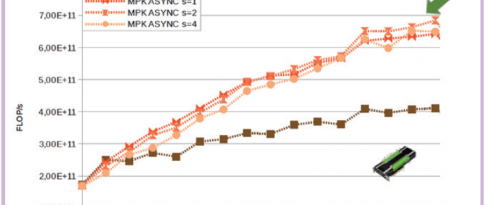01.06.2018
15 minutes of reading
Special issue: Computational Performance
Numerical simulations and scientific calculations are widely used in the energy field: to manage oil and gas reserves, exploit geothermal energy and design wind farms, for example. However, these physical models are increasingly complex, involving hydraulic, mechanical, chemical and thermal couplings. Numerical methods must also be able to handle phase changes as well as heterogeneous and multiscale media, that may contain evolving discontinuities. Accordingly, the algorithms to be developed require a large amount of operations.
Thanks to parallel algorithms, combined with specific programming models, data and operations are distributed between several computing resources — processors, cores and graphics cards — making the effective communication between these entities a real challenge. To improve code performance, IFPEN has developed algorithms based on domain decomposition techniques, particularly for particle simulations and sparse linear solvers. IFPEN is also developing adaptive methods, based on multiscale approaches,
as well as statistical treatments and a posteriori error estimates.
I hope you enjoy reading this issue.
Jocelyne Erhel, Member of IFPEN's Scientific Board
Solving sparse linear systems on heterogeneous architectures
Numerical simulation is a strategic tool, complementary to experimental studies, used to gain a precise understanding of complex physical phenomena.
Pushing back the boundaries of parallelization
The numerical simulation and HPCa professions have benefited significantly from technological advances in the field of processors, particularly
More efficient flow simulations inspired by optimal control
Multiphase mixture (gas and liquid) flow simulation in porous media has a variety of applications in the field of geosciencesa but also in the fields of
Faster and just as good: the motto of adaptive methods
In the field of numerical simulation, a sufficiently accurate representation of the data associated with physical models requires, in general, a very large numerical grid
Wind turbines have the wind in their sails, thanks to GPUs
IFPEN has been carrying out research in the field of floating wind turbines for a number of years, developing, for this purpose, the DeepLines WindTM
A hydro-mechanical model for underground naturally fractured rocks
Natural underground fractures in rocks provide fluids with preferential flow pathways.







